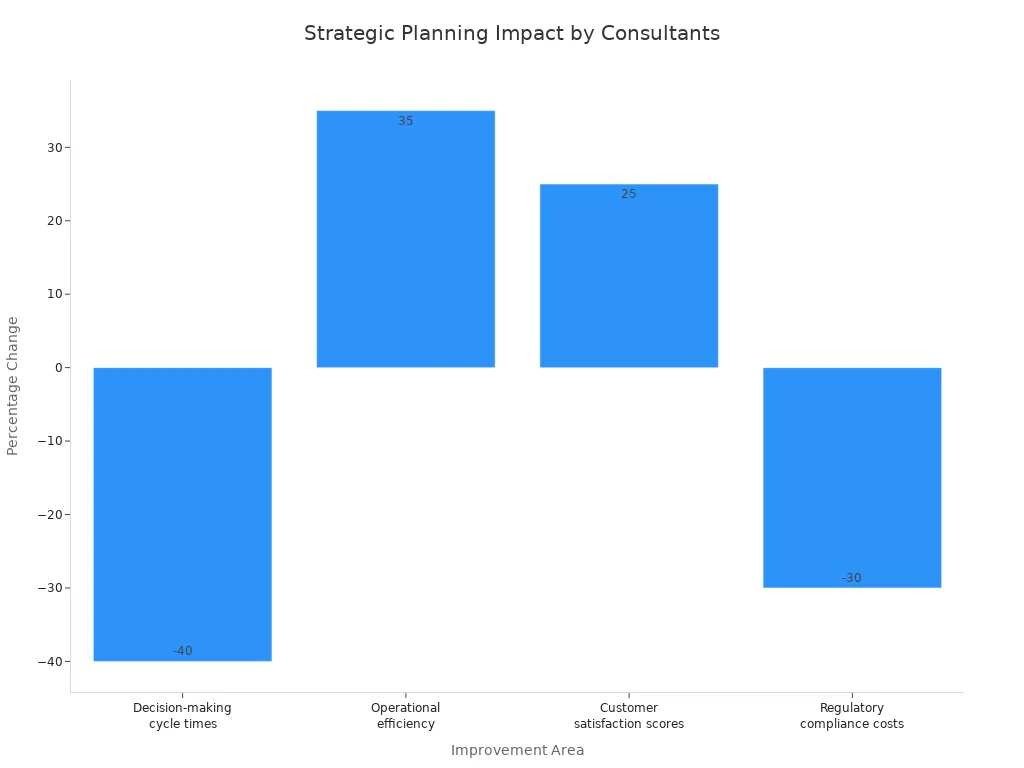Can Business Consulting Services Help Your Company Win

Yes, business consulting services can help a company win. Consultants redefine goals and identify opportunities, giving organizations a fresh look at their operations. Companies often see improved performance and efficiency when they use expert Knowledge to guide Business Management and Sales strategies. Business consulting aligns goals with strategic objectives and uses data-driven decisions to boost growth. The global demand for consulting continues to rise, with nearly 40% centered in the U.S. Unbiased advice leads to better resource allocation and measurable results.
Key Takeaways
Business consulting services provide expert advice to improve company performance and efficiency.
Consultants help organizations identify opportunities and redefine goals for better alignment with strategic objectives.
Engaging consultants can lead to measurable improvements in operational efficiency and customer satisfaction.
Consultants offer tailored solutions that address specific challenges within an organization.
Companies often see significant cost savings and increased revenue after implementing consulting recommendations.
Consultants guide businesses through change management, ensuring smooth transitions during periods of transformation.
Selecting the right consultant involves assessing credentials, cultural fit, and engagement models to match company needs.
Regularly evaluating the need for consulting can help organizations overcome stagnation and inefficiencies.
Business Consulting Services Overview
What Are Business Consulting Services
Business consulting services provide expert advice to organizations seeking to improve performance, efficiency, and growth. These services help companies solve complex problems, develop strategies, and implement solutions that drive measurable results. Consultants use their knowledge and experience to analyze business operations, identify opportunities, and recommend changes that align with company goals. Many organizations turn to business consulting when they need objective analysis or specialized skills that may not exist within their teams.
Types of Business Consulting
Leading firms offer a wide range of business consulting services. Each type addresses specific needs within an organization. Common types include:
Planning and strategic consulting: Defines mission, vision, and business strategy.
Execution guidance: Supports the implementation of business strategies.
Lead acquisition consulting: Helps attract and convert leads into customers.
Operations management advice and training: Improves processes and addresses operational challenges.
CRM and sales management advice: Enhances customer relationships and sales processes.
Strategy consulting: Aligns company vision with actionable strategies.
Marketing and sales consulting: Drives revenue growth through targeted marketing.
Risk and compliance consulting: Guides companies in regulatory compliance and risk management.
Consulting services differ in scope and specialization across industries. The following table shows the main types of consultancies and their focus:
Type of Consultancy | Description |
|---|---|
Pure Players | Companies that solely provide consulting services, such as McKinsey, BCG, Bain & Company. |
Hybrid Firms | Companies that offer consulting alongside other services, such as Deloitte, EY, PwC. |
Specialist Firms | Consultancies focused on specific industries or functions. |
Niche Consultancies | Firms that cater to very specific market needs or sectors. |
Who Are Business Consultants
Business consultants are professionals with expertise in areas such as strategy, operations, marketing, and technology. They often have backgrounds in management consulting, finance, or industry-specific roles. Consultants work with organizations to identify challenges, develop solutions, and guide implementation. Many top consulting firms employ consultants with advanced degrees and specialized training. These professionals bring objective analysis and industry knowledge to every project.
Why Business Consulting Matters
Business consulting plays a critical role in helping organizations achieve their goals. Consultants identify opportunities to enhance sales performance and align efforts with market trends. They focus on developing employee capabilities through training and leadership development, which leads to improved productivity and innovation. Consultants also assist in defining and enhancing a business's strategy, ensuring it resonates with the target audience and reflects company values.
"The 'Evidence Movement' targets at increasing decision-making quality in management, which is crucial for improving organizational performance."
Research shows that organizations with higher percentages of management consultants and CPA-qualified employees experience better business performance. Consultants help companies restructure, accelerate problem-solving, and strengthen internal capabilities. They provide objective analysis and strategic insight, especially during periods of rapid change.
Business consulting services address industry-specific challenges by offering tailored strategies and insights. Management consulting helps organizations improve performance through restructuring and change management. Strategy consulting develops recommendations for navigating complex business scenarios. Each consulting type faces unique challenges, such as meeting client expectations and adapting to market changes.
The value of business consulting lies in its ability to deliver measurable improvements. Consultants guide strategic planning and execution, helping organizations stay competitive and achieve long-term success.
Business Strategy Consulting

Business strategy consulting blends planning, technology, and execution to help organizations achieve their goals. Consultants work with companies to develop strategies that address current challenges and prepare for future opportunities. They use their expertise to guide businesses through complex decisions and transitions.
Strategic Planning
Strategic planning forms the foundation of business strategy consulting. Consultants help organizations define clear objectives and create actionable plans. They use data analysis and industry insights to shape strategies that drive growth and innovation.
Developing Strategies
Consultants collaborate with leadership teams to develop strategies that align with business goals. They encourage companies to break old habits and consider new approaches. Consultants bring wisdom from outside industries, offering fresh perspectives that foster innovative thinking. They help businesses focus their time on critical challenges and articulate a clear vision for future success.
Benefit | Description |
|---|---|
Break Old Habits | Helps companies challenge ingrained habits and consider new approaches. |
Wisdom from Outside Industries | Provides diverse insights from various sectors, fostering innovative thinking. |
Focus Your Time | Offers dedicated time to address critical challenges, freeing up internal resources for innovation. |
Articulate Your Vision | Assists in defining a clear vision and strategy for innovation initiatives. |
Make Connections | Leverages extensive networks to connect businesses with necessary resources and talent. |
Learn Through Doing | Facilitates hands-on learning of innovative practices and methodologies during the consulting process. |
Consultants also align business units and teams around focused goals. They guide organizations to shift focus from standard metrics to shared outcomes, which improves collaboration and results.
Execution Guidance
Consultants provide execution guidance to ensure strategies become reality. They help companies implement plans efficiently and monitor progress. The impact of strategic consulting can be seen in measurable improvements:
Improvement Area | Percentage Change |
|---|---|
Decision-making cycle times | |
Operational efficiency | 35% increase |
Customer satisfaction scores | 25% improvement |
Regulatory compliance costs | 30% reduction |

Navigating Change
Consultants play a vital role in helping companies navigate change. They use change management consulting to guide organizations through transitions and ensure smooth adaptation to new conditions.
Change Management
Strategy consultants help businesses manage change by developing strategies that address both immediate needs and long-term impacts. They guide firms through change management processes, making transitions smoother and positioning companies for future growth.
Businesses now expect strategic guidance from consultants, focusing on change management and training for long-term success.
Consultants also help companies adapt to technology shifts, such as AI automation. They provide strategic insights that help organizations respond to tech overload and economic pressures.
Growth Support
Consultants support growth by implementing renewal strategies and shared value initiatives. They connect businesses with resources and talent needed for expansion. Consultants also facilitate hands-on learning, helping teams adopt innovative practices and methodologies.
Strategy consultants help develop shared value strategies that enhance competitiveness while benefiting communities.
They implement renewal strategies to revitalize competitiveness in challenging conditions.
Consultants guide firms through change management, ensuring smooth transitions and positioning for future growth.
Business consulting and strategic consulting deliver measurable value by helping companies innovate, adapt, and grow. Consultants unlock potential and drive long-term success.
Consulting Services for Performance
Consulting services play a vital role in solving operational problems and improving organizational effectiveness. Companies often face challenges that slow growth or reduce efficiency. Consultants step in to identify these issues and deliver targeted solutions that drive business performance.
Problem Solving
Identifying Challenges
Consultants begin by analyzing business operations to uncover hidden obstacles. They use data-driven methods to pinpoint inefficiencies, gaps in processes, or areas where the business model needs transformation. Management consulting firms often rely on workforce analytics to track productivity metrics. This approach helps leaders make informed decisions and streamline operations. Consultants also build strong client relationships, which allows them to understand unique challenges and tailor their solutions.
Solutions and Tools
Once consultants identify the core issues, they recommend practical solutions. These may include process redesign, automation tools, or new management strategies. Data-driven solutions help streamline workflows and improve project management. Consultants often provide tailored proposals based on timely data insights, which fosters trust and confidence in their expertise. By focusing on the client's needs, consultants ensure that solutions align with business goals and deliver measurable results.
Efficiency and Productivity
Process Optimization
Operations consulting focuses on optimizing business processes to boost efficiency. Consultants review current workflows and suggest improvements that reduce manual effort and minimize errors. They help companies implement best practices and standardize procedures. Engaged employees often lead to increased client satisfaction and improved productivity. Companies that work with consultants report a positive impact on their bottom line, including a 20 percent improvement in employee experience scores and a significant reduction in consultant spend.
Technology Integration
Technology plays a key role in modern operations consulting. Consultants assist businesses with digital transformation by evaluating existing technology and identifying areas for improvement. They create digital strategies that align with company objectives and provide support during implementation. Consultants guide change management and train staff to adapt to new systems. By leveraging digital tools, companies can automate repetitive tasks, streamline workflows, and optimize performance. Consultants bring specialized knowledge and an unbiased perspective, helping businesses allocate resources efficiently and achieve maximum return on investment.
Continuous improvement remains essential for adapting to customer needs. Stakeholder engagement and delivery excellence ensure that consulting solutions meet expectations and drive lasting success.
Operations consulting, when combined with business consulting and strategy, helps organizations address critical issues, improve efficiency, and deliver value to customers. Consultants support business model transformation and guide companies toward sustainable growth.
Real Impact of Business Consulting

Case Studies
Success Stories
Consulting firms have shaped the success of many organizations by delivering targeted solutions. These stories highlight how business consulting services drive real change:
101 Strategy & Transformation Case Studies of Consulting Firms: This collection demonstrates how consulting firms adapt business models and improve client services through strategic initiatives.
Lean Manufacturing Optimization for Mid-Sized Consulting Firm in Healthcare: A healthcare consulting firm faced a 20% increase in operational costs. Consultants introduced Lean Manufacturing principles, which reduced waste and improved efficiency across systems and teams.
Robotic Process Automation for Mid-Size Professional Services Firm: Consultants helped a professional services firm integrate robotic process automation (RPA). This move addressed a 20% rise in operational costs and improved client retention by streamlining workflows within systems and teams.
Workforce Training Strategy for Boutique Consulting Firm in Professional Services: A boutique firm experienced a 20% decline in project efficiency. Consultants revamped the training program, which led to higher client satisfaction and better performance from systems and teams.
Customer Satisfaction Revitalization for Professional Services Firm in Digital Market: Consultants recognized a drop in client feedback. They developed a new customer satisfaction strategy, which improved client relationships and strengthened the firm's reputation.
These examples show how business consultants work with organizations to solve complex problems and support business growth.
Lessons Learned
Consultants often find that success depends on understanding the unique needs of each client. They tailor solutions to fit the specific challenges faced by systems and teams. Effective consulting requires clear communication, ongoing measurement, and a willingness to adapt strategies as conditions change. Consultants also learn that collaboration between business consultants and client teams leads to better results. When consultants empower systems and teams, organizations see lasting improvements in efficiency and growth.
Measurable Outcomes
KPIs
Consulting firms use key performance indicators (KPIs) to measure the impact of their work. These KPIs help organizations track progress and assess the value of consulting services. Common KPIs include:
KPI Type | Examples |
|---|---|
Financial KPIs | Revenue growth, Profit margins, Return on investment (ROI) |
Client Satisfaction KPIs | Client feedback ratings, Referral rates, Repeat business from existing clients |
Operational Efficiency KPIs | Time required to complete tasks, Resource utilization rates, Reducing errors or rework |
Consultants focus on these KPIs to ensure that systems and teams achieve measurable improvements. By tracking these indicators, organizations can see the direct benefits of business consulting.
ROI
Return on investment (ROI) stands as a critical measure of consulting success. Companies that use business consulting services often report average savings of 10-15%. Consultants help clients optimize resources, reduce costs, and increase revenue. These improvements reflect the value that consulting brings to both systems and teams.
Prominent consulting firms, such as ERM, measure their impact by quantifying project outcomes, tracking inputs and outputs, and establishing methodologies to assess the positive impacts of their services. They recognize the complexities involved in measuring impact, particularly in professional services, and have begun to pilot methodologies to better quantify these outcomes. For instance, ERM has focused on projects contributing to a lower carbon economy, tracking relevant data and planning to assess both positive and negative impacts in future evaluations.
Consultants use these methods to provide clients with clear evidence of business growth and strategic progress. Business consulting, when applied effectively, delivers measurable value and supports long-term success for organizations.
Is Consulting Services Right for You
Choosing whether to engage business consulting services requires careful assessment. Companies benefit most when they recognize the signs that indicate a need for outside expertise. Leaders should evaluate their current performance, identify persistent challenges, and consider how consultants can help address these issues.
Signs You Need Consulting
Many organizations face obstacles that slow progress or limit growth. Consultants often step in when internal solutions no longer deliver results. Common signs that a company could benefit from consulting include:
Stagnant growth
Inefficient operations
Lack of expertise
Challenges in regulatory compliance
Poor customer experience
Difficulties in strategic planning
Challenges in talent acquisition and retention
Stagnant Growth
Stagnant growth signals a need for change. Companies may see flat revenue, declining market share, or missed opportunities. Consultants analyze business performance and recommend strategies to reignite growth. They help identify new markets, improve offerings, and streamline processes.
Inefficiencies
Inefficiencies often appear as wasted resources, slow workflows, or repeated errors. Consultants use data-driven methods to uncover the root causes. They suggest process improvements and technology upgrades to boost productivity. For example, lagging and leading metrics help leaders measure performance:
Type | Metric |
|---|---|
Lagging | Recognized Revenue |
Lagging | Project Profitability |
Lagging | Resource Utilization |
Leading | Sales Pipeline |
Leading | Scheduled Billable Hours |
Leading | Forecasted Revenue Recognition |
Leadership Issues
Leadership issues can disrupt progress and lower morale. Consultants provide guidance on leadership development and team alignment. They help leaders communicate more effectively and set clear goals. Emotional intelligence and relationship management play a key role in building trust and resolving conflicts.
According to a global survey by PwC, 32% of customers say they would stop doing business with a brand they love after just one bad experience. This highlights the importance of improving customer experience and addressing internal challenges quickly.
Choosing a Consultant
Selecting the right consultant shapes the success of any project. Companies should focus on several key criteria to ensure a good match.
Credentials
Consultants with strong credentials and practical experience deliver the best results. Trust forms the foundation of successful consulting relationships. Open communication and understanding client needs are essential. Practical experience, such as internships and hands-on projects, helps consultants apply knowledge in real-world scenarios. As consultants advance, they develop skills in strategic ownership and relationship management. Clients value results and efficiency over credentials alone.
Cultural Fit
Cultural fit ensures smooth collaboration and lasting impact. Consultants who understand the company’s values and work style foster harmony and reduce conflict. A cohesive environment increases productivity and employee satisfaction. Poor cultural fit can lead to miscommunication and strained relationships.
Understanding traits that contribute to business success helps companies hire consultants who align with their culture.
A cohesive work environment reduces frustration and conflict.
Employees who feel accepted and empowered show higher productivity.
Poor cultural fit can result in communication problems and lower morale.
A study in the Journal of Organizational Behavior found that companies with strong cultural consensus and adaptability perform better financially, especially during volatile periods.
Engagement Models
Different engagement models offer unique advantages and challenges. Companies should choose a model that matches their needs and resources.
Engagement Model | Advantages | Challenges |
|---|---|---|
Time and Material | Flexibility, Transparency, Adaptability | Cost unpredictability, Requires careful oversight |
Retainer | Ongoing Support, Stronger Relationships, Predictable Revenue | Potential underutilization of services if client needs change |
Collaborative Model | Enhanced communication, Stakeholder involvement, Successful project outcomes | Requires commitment from all stakeholders, May need more resources for effective collaboration |
Solo Model | Deep transformation for a few clients | Limited reach, High resource demand |
Firm Model | Moderate impact for many clients | Less depth of engagement per client |
Productized Model | Focused improvement for a large number of clients | May lack customization for individual client needs |
Hybrid Model | Customized impact mixing high-touch consulting and scalable elements | Complexity in managing different engagement types |
Tip: Companies should review their goals and resources before selecting an engagement model. The right choice supports project success and maximizes value from business consulting.
Business consulting helps companies achieve measurable growth and operational efficiency. Successful organizations benefit from expert analysis, tailored support, and streamlined processes. The following table highlights key takeaways:
Key Takeaway | Description |
|---|---|
Expert Analysis | Consultants offer insights in strategy, operations, and technology. |
Operational Efficiency | Enhanced productivity and competitive advantage result from consulting. |
Tailored Support | Personalized advice helps optimize business operations. |
Companies often see increased market share, expanded networks, and access to specialized knowledge. Strategic investments in consulting align with long-term goals and profitability. Readers should evaluate their own needs and consider consulting as a path to success. For more information, reach out to us and discover how consulting can support your business.
FAQ
What does a business consultant do?
A business consultant analyzes company operations. They identify problems and suggest solutions. Consultants help improve efficiency, boost growth, and guide strategic planning.
How long does a typical consulting project last?
Project length varies. Some projects finish in weeks. Others may take several months. The timeline depends on company goals and the complexity of challenges.
Can small businesses benefit from consulting services?
Small businesses gain valuable insights from consultants. They receive expert advice on strategy, marketing, and operations. Consultants help small companies compete and grow.
How do companies measure the success of consulting services?
Companies track key performance indicators (KPIs). Common KPIs include revenue growth, cost savings, and customer satisfaction. These metrics show the impact of consulting.
What industries use business consulting services?
Many industries use consulting services. Examples include healthcare, finance, technology, retail, and manufacturing. Consultants tailor solutions to fit each industry’s needs.
How much do consulting services cost?
Consulting fees depend on project scope, consultant experience, and engagement model. Some consultants charge hourly rates. Others use fixed fees or retainers.
What should companies look for when choosing a consultant?
Companies should check credentials, experience, and cultural fit. They should review past projects and ask for references. A good consultant understands company goals and delivers results.
Do consultants help with technology adoption?
Consultants guide companies through technology changes. They recommend digital tools, train staff, and support system integration. Technology adoption improves efficiency and competitiveness.



